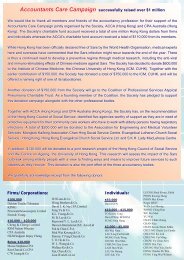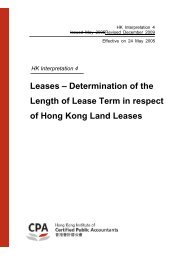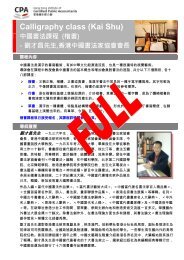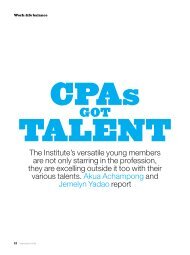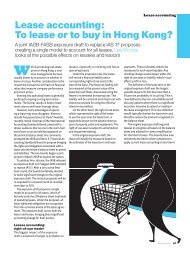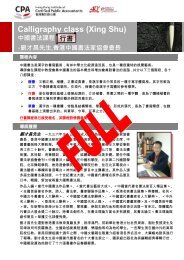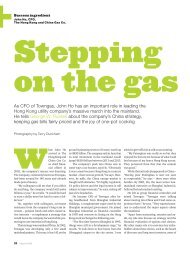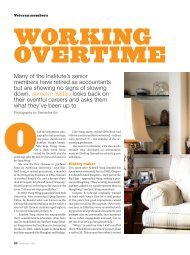Flagship fashion - Hong Kong Institute of Certified Public Accountants
Flagship fashion - Hong Kong Institute of Certified Public Accountants
Flagship fashion - Hong Kong Institute of Certified Public Accountants
Create successful ePaper yourself
Turn your PDF publications into a flip-book with our unique Google optimized e-Paper software.
Consulting<br />
revenue growth <strong>of</strong> 5.8 percent and 13 percent<br />
respectively. At Deloitte, consulting<br />
grew 14.9 percent in 2010-11, while the<br />
separately categorized financial advisory<br />
services rose 15.1 percent. By contrast, revenue<br />
from tax advisory increased just 5.2<br />
percent and audit and related services by<br />
only 4.7 percent.<br />
The other firms recorded similarly impressive<br />
increases, and that’s just from consulting<br />
units within the accounting firms. In<br />
addition, Big Four firms can cross-sell consulting<br />
products and services across their<br />
sub-brands. Deloitte, for example, has an<br />
advisory practice and a financial services<br />
advisory practice as well as a stand-alone<br />
consulting company, Deloitte Consulting.<br />
Back from the brink<br />
Only 10 years ago, the consulting business<br />
was in disarray. Disgraced by the Enron<br />
collapse and the dismantling <strong>of</strong> Arthur<br />
Andersen, accounting firms had their consulting<br />
business seriously restricted by the<br />
Sarbanes-Oxley Act in the United States.<br />
The new laws limited the types <strong>of</strong> consult-<br />
18 May 2012<br />
ing services auditors provide to companies<br />
they audit.<br />
Accounting firms found it was no longer<br />
so easy to cross-sell their consulting services<br />
“The whole field<br />
<strong>of</strong> sustainable<br />
development and<br />
corporate social<br />
responsibility<br />
is opening up<br />
new avenues<br />
<strong>of</strong> consulting<br />
services.”<br />
and – also keen to distance themselves from<br />
the negative sentiment – started spinning<br />
and selling <strong>of</strong>f their consulting arms. IBM<br />
absorbed PwC Consulting in 2002 after it<br />
was renamed Monday for just two months.<br />
KPMG spun <strong>of</strong>f its consulting unit into Bearing<br />
Point. Ernst & Young sold its consulting<br />
unit in 2000 to the French information technology<br />
services company Cap Gemini (now<br />
Capgemini), and Accenture had split from<br />
Arthur Andersen just before the accounting<br />
firm’s collapse.<br />
While Deloitte Consulting was briefly<br />
known as Braxton, it returned to its original<br />
name in 2003, reflecting the fact that the U.S.<br />
spotlight on consulting had already begun to<br />
dim just a year after Enron.<br />
Moves by the Big Four back into the consulting<br />
business have not gone unnoticed by<br />
regulators in Europe. Last year, the European<br />
Commission proposed that auditing firms be<br />
banned from providing consulting services to<br />
companies they audit, or even be banned altogether<br />
from consulting.<br />
One reason is the accounting firms’ grip<br />
on consulting services in certain sectors. Big<br />
Four firms account for 45 percent <strong>of</strong> the financial<br />
services market worldwide, according<br />
to Big4.com, an online accounting recruitment<br />
and social network based in New York.<br />
While McKinsey & Co., Boston Consulting<br />
Group, Bain & Co. and Booz & Company<br />
dominate the headlines in consulting, their



